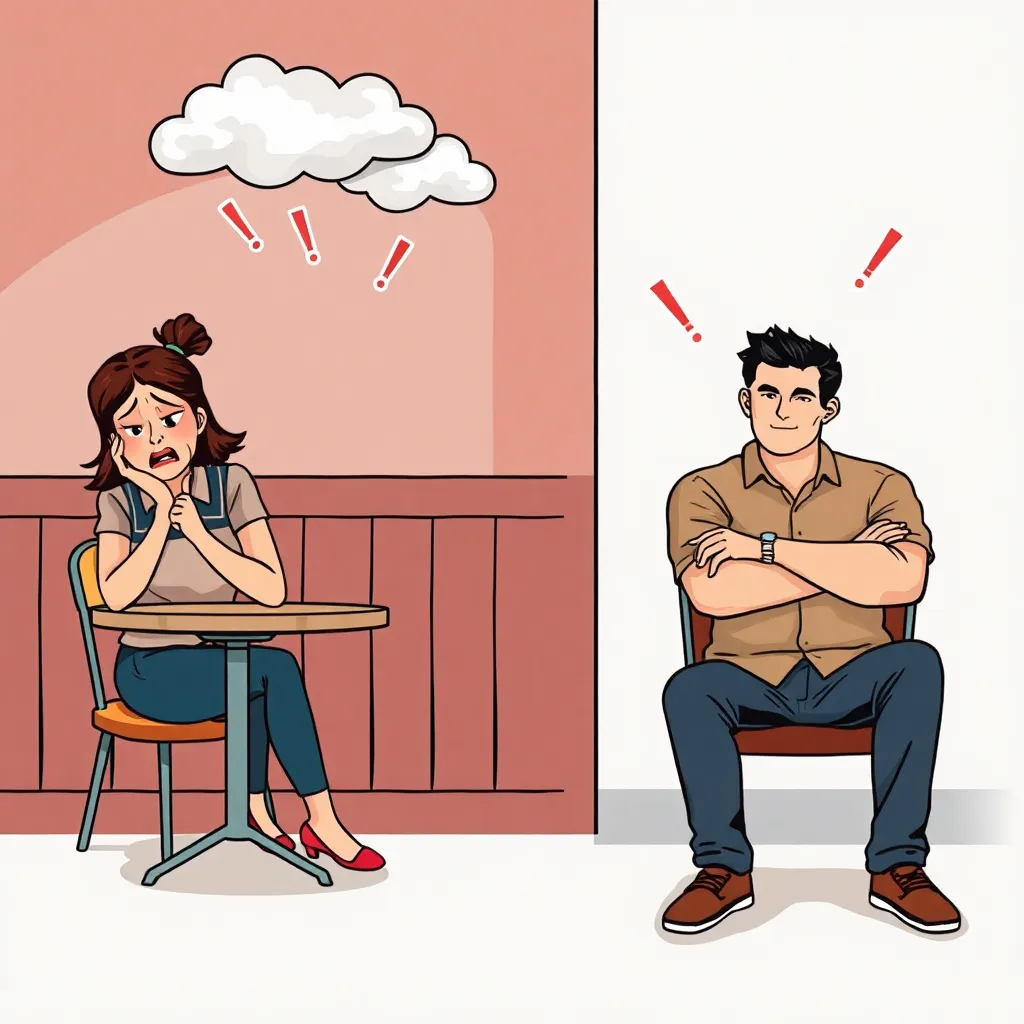Navigating the world of dating can often feel like exploring an enigmatic landscape, where the paths are sometimes obscured by the fog of emotions and expectations. It’s not uncommon to find yourself wondering if the person you’re with truly values your well-being or if their charm is masking something more concerning. Understanding the dynamics of your relationship is crucial, especially when faced with the possibility that your partner might be a narcissist. Recognizing the signs early on can protect your emotional health and lead you to more fulfilling connections.
In relationships, the subtle signs of narcissism can easily be overlooked, often cloaked in charisma and confidence. However, these traits can sometimes be indicators of deeper issues that impact your emotional and mental well-being. By identifying the warning signs, you empower yourself to make informed decisions about your relationship’s future. This article will guide you through seven key indicators that can help you discern whether your partner’s behavior aligns with narcissistic tendencies.
Recognizing these signs is not just about labeling behavior; it’s about safeguarding your emotional space and ensuring that your needs are met in a relationship. We’ll explore behaviors that may seem trivial at first but can reveal underlying patterns of manipulation and control. As you read on, you’ll gain insights into behaviors that might initially seem flattering but could signify a lack of genuine empathy and reciprocity. Let’s journey together through these warning signs and equip you with the awareness needed to foster healthier, more supportive relationships.
1. Constant Need for Admiration

Being in a relationship with someone who has a constant need for admiration can be emotionally draining. You may find yourself caught in a cycle of endless praise, only to see your partner’s mood sour when they’re not the center of attention.
Imagine being at a social gathering where your partner constantly seeks validation from everyone in the room. This behavior might leave you feeling like a mere accessory to their need for approval, rather than an equal partner.
Experts suggest this need for admiration often stems from underlying insecurities that your partner is attempting to mask. Understanding this can help you approach the situation with empathy, rather than frustration.
To manage this dynamic, try setting boundaries around the amount of attention you give and encourage your partner to find self-worth from within. This can help them rely less on external validation and more on their internal sense of value.
Remember, a healthy relationship is built on mutual respect and admiration that flows both ways. By recognizing and addressing these warning signs, you can create a more balanced and fulfilling partnership.
2. Lack of Genuine Empathy

Another common sign of a narcissistic partner is their lack of genuine empathy. They often struggle to understand or share the feelings of others, leaving you feeling unheard and unsupported.
Imagine sharing a difficult day with your partner, only to receive a dismissive response or a quick change of subject. This behavior can leave you feeling isolated and misunderstood, as if your emotions are unimportant.
Experts suggest that this lack of empathy often stems from a deep-seated focus on their own needs and desires. As a result, they may appear indifferent or unsympathetic to the emotional experiences of those around them, further alienating their partners.
To navigate this challenge, try to gently express how their responses make you feel, emphasizing the importance of empathetic communication in your relationship. Consider discussing these issues when both of you are calm, creating an environment more conducive to understanding and growth.
Ultimately, healthy relationships require empathy as a foundational element. If your partner consistently fails to show empathy despite your efforts, it may be time to reevaluate the relationship’s potential for fulfilling your emotional needs.
3. Grandiose Sense of Entitlement

Continuing from the theme of a lack of empathy, a narcissist often shows a grandiose sense of entitlement that can be particularly challenging in a relationship. They may believe that they deserve special treatment and will expect their needs to be prioritized over yours without reciprocation.
Imagine a scenario where your partner demands you change your plans because their needs come first, without any regard for your commitments. This behavior stems from their inherent belief that they are more deserving of attention and resources than others, often leaving their partners feeling undervalued.
To navigate such situations, it’s essential to establish clear boundaries early on. By communicating your needs and expectations, you can maintain a healthier dynamic and avoid being overshadowed by their demands.
Ultimately, being aware of these signs can help you make informed decisions about the future of your relationship. Recognizing a grandiose sense of entitlement is crucial for understanding the potential challenges you might face. Remember, a strong relationship is built on mutual respect and understanding.
4. Manipulative Emotional Tactics

Manipulative emotional tactics are often subtle yet powerful tools in a narcissist’s arsenal. They may use these tactics to maintain control, leaving you feeling confused and questioning your own reality. Consider a scenario where your partner frequently blames you for their mood swings or fails to take responsibility for their actions. This is a classic example of how they might deflect accountability, making you feel guilty or at fault.
Gaslighting is another common tactic, where they may deny events or conversations that have taken place. This can create a sense of doubt within you, making you question your memory and perceptions. A friend might share how their partner consistently dismisses their feelings, attributing them to over-sensitivity. Over time, this emotional manipulation can lead to a loss of self-confidence and clarity in your relationship.
Passive-aggressive behavior is also a hallmark of emotional manipulation. For instance, your partner might give you the silent treatment to punish you for perceived slights. Experts suggest that recognizing these behaviors is crucial to maintaining your emotional well-being. By understanding these tactics, you can better address the imbalances in your relationship.
Developing resilience against these tactics involves seeking support from trusted friends, family, or professionals. They can provide perspective and validation, helping you navigate your relationship more effectively. Remember, your emotional health is paramount, and no partner should undermine your sense of self-worth. Stay mindful of these signs and take proactive steps to protect your well-being.
5. Dismissive of Your Feelings

Being with someone who consistently dismisses your feelings can be emotionally exhausting. In a healthy relationship, partners validate each other’s emotions, fostering a sense of security and intimacy. However, a narcissist may frequently belittle or ignore your feelings, making you question your own reality. Imagine expressing your concerns about their behavior, only to be met with a dismissive shrug or a patronizing laugh. This behavior can slowly erode your self-esteem and make you feel insignificant.
In many cases, a narcissist may actively avoid taking responsibility for your emotional distress. For instance, if you express hurt over a forgotten anniversary, they might turn the blame around, accusing you of being overly sensitive. This tactic not only invalidates your emotions but also shifts the focus away from their lack of empathy. Over time, you might find yourself walking on eggshells, afraid to voice your concerns for fear of being mocked or ignored.
Psychologists often note that this dismissive attitude is a hallmark of narcissistic behavior. It stems from their inherent need to prioritize their own feelings above all else, often at the expense of their partners. Dr. Lisa Firestone, a clinical psychologist, highlights that such individuals lack the capacity for genuine empathy, making it challenging for them to acknowledge others’ emotions. Understanding this can be the first step in recognizing the pattern and taking action to protect your well-being.
To counteract this damaging dynamic, it’s crucial to set clear boundaries and communicate your needs assertively. Instead of allowing your feelings to be invalidated, practice expressing them with clarity and confidence.
By prioritizing your emotional health, you can create a space where your feelings are heard and valued. Ultimately, acknowledging this behavior is vital, as it empowers you to make informed decisions about your relationship’s future.
6. Exaggerated Self-Importance Claims

When someone constantly makes exaggerated self-importance claims, it can be a red flag in a relationship. Often, a narcissistic partner will boast about their achievements, sometimes taking credit for things they didn’t actually do. This can leave you feeling overshadowed and undervalued, as their need for admiration seems to eclipse your own contributions.
Consider a scenario where your partner frequently talks about their supposed influence at work, even when facts suggest otherwise. Such behavior not only serves to inflate their ego but can also subtly undermine your confidence, making you question your worth. In these situations, it’s essential to maintain a clear perspective and not let their need for recognition diminish your own self-esteem.
Experts suggest that those with narcissistic tendencies often crave validation through exaggerated stories and self-promotion. This behavior can be exhausting for their partners, who might feel like they’re always in competition for attention and validation. Recognizing this pattern is the first step toward addressing it effectively.
Ultimately, awareness of these exaggerated claims can help you set healthy boundaries and decide how to proceed in the relationship. Understanding why your partner behaves this way allows you to approach the situation with empathy while protecting your own well-being. Reflecting on these dynamics can lead to a more balanced partnership where both individuals feel valued and heard.
7. Obsessive Focus on Appearance

In relationships with a narcissist, one might notice an obsessive focus on appearance that feels overwhelming. This can manifest as constant concern about their own looks or an insistence on how their partner should look in public.
Often, a narcissist will spend an inordinate amount of time grooming themselves, ensuring they always present a perfect image to the world. This behavior can lead to frequent criticisms of their partner’s appearance, creating a dynamic where looks are prioritized over genuine connection.
Imagine being at a family gathering where their focus is more on capturing the perfect selfie than on engaging with loved ones. Such scenarios highlight how their self-esteem is tied to external validation, often seeking compliments and admiration from those around them.
Experts suggest that this preoccupation with appearance is a reflection of their inner insecurities. Understanding this can help you approach the situation with empathy, recognizing the deeper issues at play while setting boundaries to protect your well-being.
In conclusion, while appearance may hold importance, a relationship should not revolve solely around it. Cultivating a deeper connection based on shared values and respect is essential for a healthy, fulfilling partnership.
Conclusion: Creating Beautiful Outdoor Spaces
In navigating the complex world of relationships, recognizing the seven warning signs of dating a narcissist is crucial for your emotional well-being. These signs include excessive self-focus, a lack of empathy, manipulation tactics, constant need for admiration, boundary violations, blame-shifting, and emotional volatility. Understanding these behaviors empowers you to make informed decisions, protecting your heart and fostering healthier connections.
As an immediate next step, reflect on your relationship dynamics and openly discuss any concerns with a trusted friend or therapist. This candid conversation can provide clarity and support as you decide the best path forward.
To keep this valuable information at your fingertips, save or bookmark this article now. It can serve as a guiding light whenever you need a reminder of the signs to watch for in your relationships.
Remember, the journey to relationship success begins with awareness and action. By recognizing these red flags and taking proactive steps, you pave the way for nurturing and fulfilling partnerships. Embrace this opportunity to cultivate a relationship where mutual respect and genuine connection thrive. Your future self will thank you!
